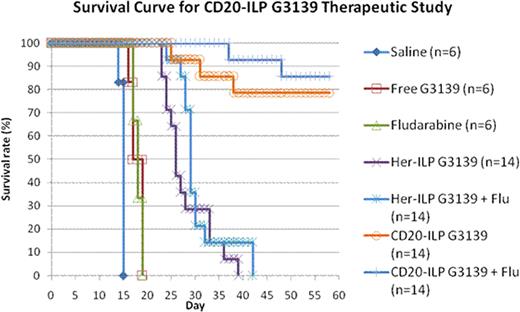Abstract
Abstract 1475
Therapeutic application of several CpG-containing anti-sense oligodeoxyribonucleotides (ODN) and siRNAs are limited due to their potent immune stimulatory properties. To resurrect these promising agents for clinical application, we have developed an antibody based liposomal delivery strategy that overcomes the immunostimulatory properties without compromising the target down modulation. We show here G3139, an archetypical anti-sense ODN for Bcl-2, induced activation of NF-kB, which results in the up-regulation of its downstream anti-apoptotic targets such as Bcl-2 (22.5%, n=10, p=0.04) and Mcl-1 (35.0%, n=4, p<0.005) and co-stimulatory markers such as CD86 (47.5%, n=10, p<0.05) and HLA-DR (175%, n=10, p<0.005) as well as cytokine flare in B chronic lymphocytic leukemia (CLL) cells. These adverse immunostimulatory responses are abrogated by Rituximab mediated immunoliposomal delivery of G3139, resulting in significant Bcl-2 down-regulation and ∼60% enhanced sensitivity to fludarabine induced cytotoxicity (n=4, p<0.001). Consistent with the in-vitro observations, significant in-vivo therapeutic efficacy was demonstrated in a SCID mouse xenograft leukemia/lymphoma model. A total of 74 female 6- to 8-week-old SCID mice were engrafted with 2×106 Raji cells through tail vein injection on Day 0. The 10-day treatment was initiated via i.p. injection on Day 4. Fludarabine and G3139 were injected into the mice at the dose of 100mg/kg/day and 5mg/kg on alternative days respectively. Hind limb paralysis was considered as the key endpoint while other early removal criteria were also considered. The median survival time for placebo controls was 15 to 18 days without liposomal G3139 treatment. Although the in-vivo experiment is still in progress, CD20-targeting ILP-G3139 has already shown significant therapeutic efficacy with >80% survival rate (n=14) at day 58 of the study as a single agent or in combination with fludarabine treatment, compared to the mice treated with the control Her-ILP-G3139 that showed hind-limb paralysis before Day 45 in all mice. These results indicate potential use of targeted delivery vehicles to resurrect and improve the clinical efficacy of immunostimulatory oligonucleotide therapeutics for B-cell malignancies.
No relevant conflicts of interest to declare.
Author notes
Asterisk with author names denotes non-ASH members.


This feature is available to Subscribers Only
Sign In or Create an Account Close Modal